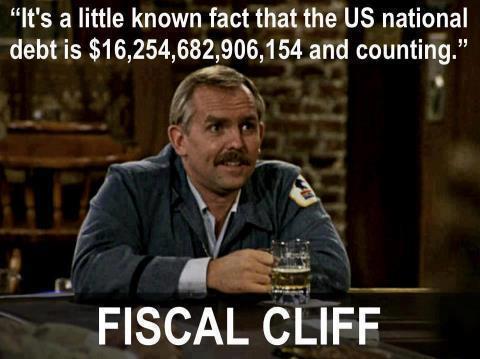Trickle-down economy could work... when the government holds the purse strings.
In a recent discussion with a friend, on the issue of the U.S. national debt, we talked about how to best solve the problem. Being of the liberal mindset, I, of course, talked about raising taxes, specifically, ending the Bush Tax Cuts for the wealthy (those households making over $250,000 per year), which would result in increased tax revenue for the government. But the budget cannot be balanced and the debt shrunk on tax increases alone. There has to be cuts as well. This blog post is the expansion of ideas that started bubbling in my head from that discussion.

Fiscal Cliff! Source: The interwebs.
First, let's talk about taxes. There is one school of thought that says we should cut taxes for the wealthy because that will spur them to spend more, creating more jobs, which in turn will boost the economy; the trickle-down effect. Historical evidence, however, suggests quite the opposite. Economic growth has actually been highest when marginal tax rates have been highest. Why would this be? You can read the long version of the answer here. (I couldn't find any empirical evidence for this but it sounds very reasonable to me. If you have a better theory or evidence that says otherwise, I would love to hear it. Please post it in the comments below.) The short version is, when taxes are low, the rich, who already have everything they need tend to hoard their wealth. When taxes are high, they spend that money to grow their businesses, donate to charitable causes, etc. at the same time qualifying for tax deductions, which allow them to... you guessed it, hoard more of their wealth.
Don't get me wrong. I have no problem with people hoarding wealth. I do it too. But, if, in the process of maximizing one's wealth, one ends up helping someone else, well, I think that is better. Besides, having profited from the labor and resources of others, doesn't it make it one's moral obligation to give something back to the community?
I realize that the wealthy pay for a significant portion of the state's income but what does that really mean. Consider this very simple example: two people, Alice and Bob, make $50,000 and $100,000 in gross yearly income, respectively. Let's say they both pay the same rate in taxes, 10%, i.e. Alice pays $5,000 and Bob pays $10,000 in taxes. Wow! Bob pays 100% more in taxes than Alice!! Bob deserves a tax cut! Or, does he? He also has a take home paycheck that is 100% higher than Alice's. This, of course, is not real life.
In real life, people who make significantly more money (I am talking about the top 2-3%) than the average person tend to have a smaller effective tax rate, the tax rate they end up paying after taking all the deductions that their lawyers and accountants (because they can afford such services) help find for them. For the average person, most of their paycheck goes into mortgage or rent payments and food. They can't afford to hire fancy lawyers and accountants to find tax loopholes to benefit them.
There is an additional drawback to this income disparity. In a system where prices are determined by what the market will bear, those able to pay more for goods and services will skew prices of said goods and services such that those one the lower rungs of the income ladder will find it harder and harder to move up. But, this is opening up a whole different can of beans. Let me stick to the topic at hand.
How does this relate to the trickle-down economy effect? Very simple. When government has money, it has to spend it, either on services, reducing national debt or on tax breaks. It cannot hoard money like regulars folks do. When the government spends money on services, the economy grows. But, as part of any good budget, the government has to have a plan to pay down its debts. These two things cannot happen if the government cannot raise revenue, i.e. taxes.
Of course, as I mentioned, cuts to government programs may also be necessary. The question then becomes, what to cut? Education? Social services like Medicare, social security and veterans benefits? I don't think so. These are essential services if a country wants to raise the standard of living of its citizens. I admit, there can be unnecessary wastes in these areas. However, instead of throwing the baby out with the bathwater, a system of review and feedback from those utilizing the services should be set up to see which programs are most effective in getting people the help they need in order to pursue the American Dream. The rest can be reformed or cut. Where else can cuts be made? How about government subsidies to industries and corporations that rake in millions, and sometimes, billions in profits and don't pay any taxes whatsoever.
Update: Another friend of mine pointed out the huge government expense related to our military industrial complex. The U.S. military budget is bigger than the military of the next 13 biggest militaries of the world, combined! I am sure there are many places to cut wasteful spending in the military. We also have the most amount of military personnel deployed to other countries. Any money those soldiers spend using our tax dollars goes to supporting the economies of countries where they are deployed. How about about reducing the size of our military to help reduce the deficit?
I am no economist but I think I have made a reasonable and simple argument for getting rid of the Bush Tax Cuts for the wealthy. The wealthy will still prospser, and so will the rest of the country. If you think different, feel free to make your own reasonable and simple argument in the comments.

Add new comment